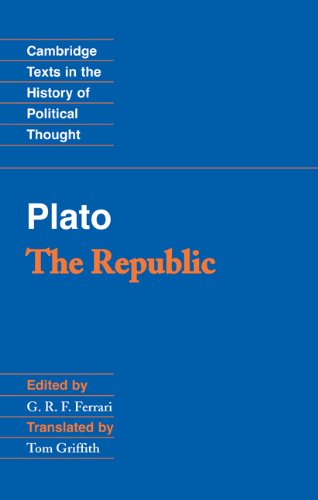Plato: The Republic (Cambridge Texts in the History of Political Thought) pdf download
Par mosley sherrie le mercredi, novembre 2 2016, 23:16 - Lien permanent
Plato: The Republic (Cambridge Texts in the History of Political Thought) by Plato, G. R. F. Ferrari, Tom Griffith


Plato: The Republic (Cambridge Texts in the History of Political Thought) book download
Plato: The Republic (Cambridge Texts in the History of Political Thought) Plato, G. R. F. Ferrari, Tom Griffith ebook
Publisher:
Format: pdf
ISBN: 052148443X, 9780521484435
Page: 436
Plato: The Republic (Cambridge Texts in the History of Political Thought) (Paperback) by Plato (Author), G. Neither must we forget that the Republic is but the third part of a still larger design which was to have included an ideal history of Athens, as well as a political and physical philosophy. The fragment of the Critias has given birth to a In English philosophy too, many affinities may be traced, not only in the works of the Cambridge Platonists, but in great original writers like Berkeley or Coleridge, to Plato and his ideas. An Historical Account of the Argument of the Two Treatises of Government' (Cambridge: Cambridge University Press, 1995). Download Plato: Gorgias, Menexenus, Protagoras (Cambridge Texts in the History of Political Thought) Plato , 427?-347 BC, Greek philosopher. Plato: The Republic (Cambridge Texts in the History of Political Thought). Some of the students only started Greek from scratch a few months ago, and the fact that they are reading Plato unadulterated at all at this point is a tribute to their intelligence and hard work, and one must reckon to our teaching too. [3] Cicero, On the Commonwealth and On the Laws. [x] Christopher Rowe, “The Place of the Republic in Plato's Political Thought”, in The Cambridge Companion to Plato's Republic, 43, 45. Rome, Sparta, Athens: three ancient polities and the political ideas they engendered have exercised a crucial impact on Western history both, in the realm of political thought and in the realm of events and institutions. In general I've been enjoying the slight liberties Tom Griffith takes in his translation of Plato's Republic (Cambridge Texts in the History of Political Thought), since they make the dialogue more natural and idiomatic. This suggests that when the Greeks thought of modality, they did not have particular scale patterns in mind, but rather distinct musical idioms.